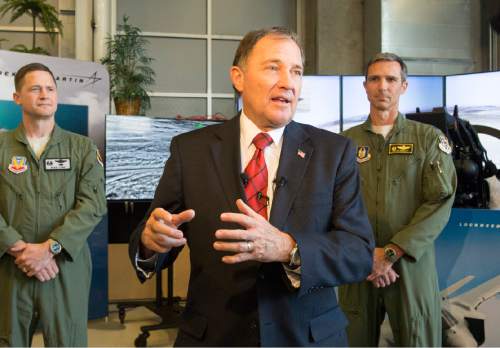This is an archived article that was published on sltrib.com in 2015, and information in the article may be outdated. It is provided only for personal research purposes and may not be reprinted.
The day after Gov. Gary Herbert voiced his support for more rigorous refugee screening, the White House sent governors a letter lauding the process the country has.
Letters were sent to all state and territorial governors and to the mayor of Washington. D.C.
In a copy sent to Herbert, and obtained by The Salt Lake Tribune, the White House informed Herbert about what the refugee vetting process looks like. The letter, dated Friday and signed by Secretary of State John Kerry and Homeland Security Secretary Jeh Johnson, emphasizes how thorough the process is and that the U.S. is prioritizing "the most vulnerable of Syrian refugees" for resettlement.
"It is important to note that the overwhelming majority of Syrian refugees we have accepted and will accept are families, victims of torture, and children," the letter reads. The letter adds that a "very small proportion" of the refugees have been, or will be, men who are not accompanied by children nor joining families in the United States.
Those men, the letter reads, "will generally be especially vulnerable adults, such as survivors of torture, LGBT individuals, or those with disabilities."
With multi-agency security measures in place, which have been enhanced in the past few years, "we believe that we are able to both protect the American people and maintain this Nation's long standing position as the world's beacon of hope and freedom," the letter adds. "Our highest priority is the protection of the American people. We look forward to working with you to ensure our Nation lives up to its humanitarian heritage while keeping the American people safe."
Jon Cox, Herbert's spokesman, responded Saturday that the governor "believes national security cannot be the sole responsibility of individual states and should not be a partisan issue."
Cox relayed Herbert's disappointment that President Barack Obama threatened to veto congressional legislation that makes the screening process more rigorous, "without instituting an outright ban. The governor believes these actions are necessary and in the best interest of Utahns."
Since the Syrian civil war began five years ago, Utah has resettled 12 Syrians, from two families, the most recent of whom arrived eight months ago. Utah expects to receive a few hundred Syrian refugees between March and October.
On Thursday, the U.S. House of Representatives voted overwhelmingly in favor of the bill that would require new FBI background checks and individual sign-offs from three high-ranking U.S. officials before any refugee could come to the U.S. from Iraq or Syria.
"To protect public safety, the federal government must have a sufficient screening process in place to prevent terrorists from entering the country, while providing relief to those who are seeking asylum from violence and oppression," Herbert said in a statement Thursday. "… As Americans, we must remember that once a terrorist enters any one state, that person has effectively entered all 50 states."
On Monday, Herbert said Utah wasn't joining the growing list of states that would try to block refugees. At that point, 27 other governors said they would, citing security concerns.
At the start of the week, Herbert had also asked the Utah Department of Public Safety to review security checks by the federal refugee-resettlement program and wanted to consult with the state's congressional delegation. Cox left open the possibility then that Herbert could change his mind after such a review.
Twitter: @MikeyPanda



